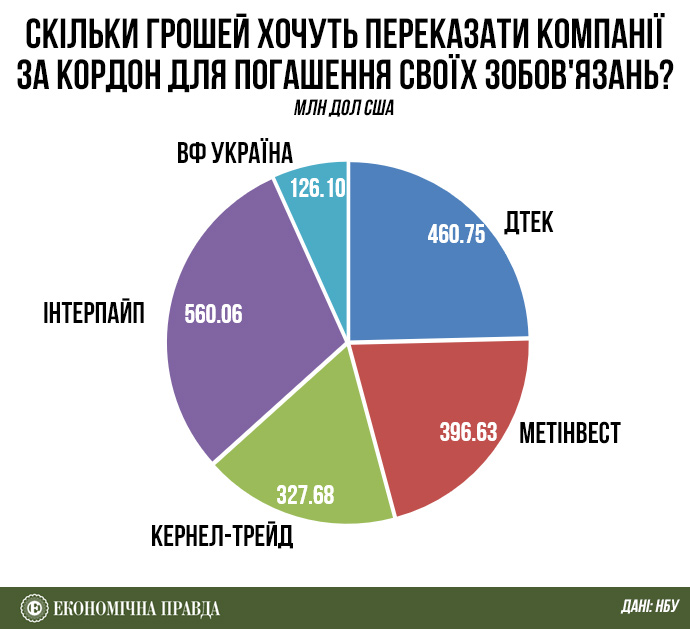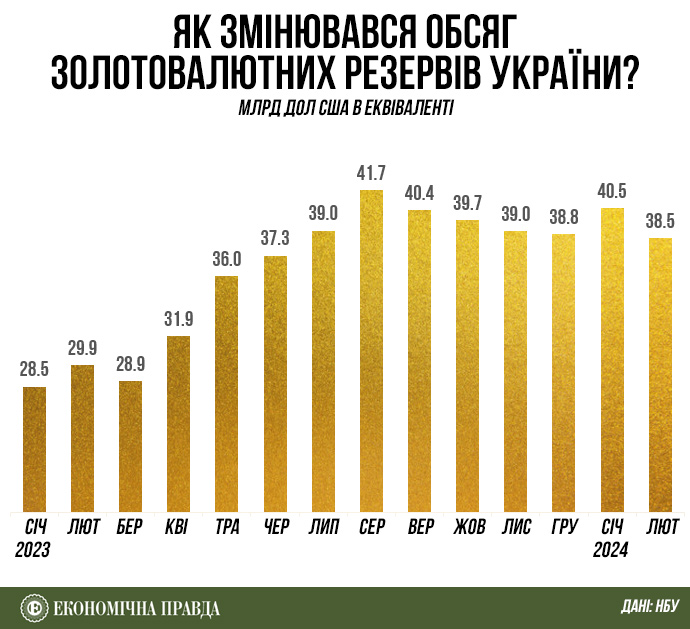С легкой руки депутатов, несмотря на запрет НБУ, чиновники решили позволить крупным бизнесменам рассчитаться по миллиардным внешним долгам. Последствия таких решений не оценили ни международные партнеры, ни Нацбанк.
В первые же часы после начала большой войны Национальный банк ввел ряд крайне жестких валютных ограничений. Причина понятна — сохранить международные резервы и финансовую стабильность в условиях абсолютной неопределенности и панических настроений среди граждан и бизнеса.
Большинство валютных ограничений продолжают работать и через более чем два года после того, как первые российские ракеты ударили по украинским городам. В частности, действующим остается и запрет для частного бизнеса переводить валюту за границу. Даже если речь идет о погашении внешних долгов. Даже если это долги крупных компаний.
Однако крупный бизнес пытается получить для себя исключение из валютных ограничений, чтобы обслуживать внешние кредиты и еврооблигации. И похоже, что ему это удается. В начале февраля правительство приняло ряд решений, которые позволяют перевести за границу в обход валютных ограничений почти 2 млрд долл. для обслуживания долгов пяти крупных групп компаний: «ДТЭК», «Метинвест», «Кернел», «Интерпайп» и «Водафон».
Теперь решение правительства обязан воплотить в жизнь Нацбанк. Однако там с этим не спешат.
Что произошло
В конце ноября 2023 года Верховная Рада приняла закон, ограничивающий максимальный размер процентной ставки по микрокредитам до 1% в день. До этого в среднем микрофинансовые компании (МФО) взимали со своих заемщиков по 2,5%, а иногда и по 5% в день.
За принятие этого закона активно выступал и Национальный банк, который регулирует рынок МФО. Правда, текст финального решения парламента содержал один неприятный для НБУ сюрприз, который касался не микро-, а макрокредитов.
Правка народного депутата Бориса Приходько (группа «Довіра») предоставила право правительству освобождать отдельные компании от валютных ограничений, которые Нацбанк ввел на время военного положения.
Для этого Кабмин должен утвердить ходатайство в НБУ, в котором попросить разрешить осуществить перевод валюты за границу определенной компанией. Центробанк рассматривает такое ходатайство и выполняет его. Отказать правительству у регулятора права нет.
Уже в начале февраля ряд компаний испытал новый закон в действии. Они убедили Кабмин принять 15 ходатайств в НБУ по осуществлению перевода более 1,8 млрд долл.
Обращение правительства касались предприятий пяти крупных групп: «ДТЭК» и «Метинвест» Рината Ахметова, «Кернел» Андрея Веревского, «Интерпайп» Виктора Пинчука и «Водафон» азербайджанской «НЕКСОЛ Холдинг».

Ранее Кабмин уже обращался в Нацбанк с ходатайствами о разрешении на перевод валюты. Однако тогда речь шла о гораздо меньших суммах, которые важно было разрешить вывести за границу.
Как сообщили ЭП в НБУ, в 2022-2023 годах там приняли 9 решений о предоставлении разрешения перевести средства за границу на общую сумму, эквивалентную 67 млн долл (1 решение в 2022 году на 29 млн долл и 8 решений в 2023 году на 38 млн долл).
На этот раз ходатайство правительства касаются суммы, которая эквивалентна около 5% золотовалютных резервов, которое регулятор обязан выполнить в условиях, когда уже в течение двух месяцев в экономику почти не поступает жизненно важное внешнее финансирование.
Для чего компаниям исключение из валютных ограничений
Последние годы перед большой войной украинские компании активно выходили на международные рынки капитала. Порой их кредитные рейтинги были даже выше, чем у их суверена, то есть Украины, что в принципе вне правил рейтинговых агентств.
В отличие от украинского, на европейском финансовом рынке занимать средства в валюте намного выгоднее. Особенно дешево это было делать накануне 2022 года, когда в мире продолжался период рекордно низких процентных ставок. Обслуживать эти долги, как правило, также не было проблемой, ведь такие заемщики ориентированы на экспорт и большинство своей выручки получают в иностранной валюте.
Однако 24 февраля 2022 года Национальный банк принял постановление, которым запретил бизнесу выводить валюту за пределы Украины. Фактически это решение могло привести к дефолтам компаний, которые привлекали средства за рубежом. Однако те находили пути, как продолжать платить по своим долгам.
«За два года с начала полномасштабного вторжения в Украину «Метинвест» использовал более 500 миллионов долларов собственных оборотных средств на обслуживание еврооблигаций. Это стало возможным прежде всего за счет оборотного капитала материнской и международной торговой компании Группы», — пояснили ЭП в «Метинвест».
Частично обслуживать валютные долги помогало и то, что крупные украинские бизнесы не возвращали в страну валютную выручку от экспорта. Кроме этого, отметил ЭП собеседник в Нацбанке, некоторые компании прибегали к манипуляциям, осуществляя фиктивный импорт, чтобы перевести валюту за границу.
Как бы там ни было, однако похоже, что возможности платить по выпущенным евробондам у некоторых бизнесов, исчерпываются. По крайней мере, об этом они говорят публично.
«С февраля 2022 года «Интерпайп» принимала все возможные меры для стабильной финансовой деятельности и расчетов с кредиторами, но на сегодня исчерпала внутренние резервы для обслуживания своих кредитных обязательств и находится на грани дефолта из-за наличия ограничений, установленных НБУ (при наличии достаточных собственных финансовых ресурсов и собственной валюты)», — отметили в «Интерпайп», который просит у НБУ разрешения на перевод более полумиллиарда долларов.
Объясняя, для чего им исключения из валютных ограничений, крупные компании отмечают, что это поможет избежать дефолта, сохранить инвестиционную привлекательность Украины и даже привлекать новые инвестиции.
«Выполнение финансовых обязательств перед иностранными банками — это то, что украинский бизнес может и даже должен делать в условиях военных реалий для поддержания экономики и положительной инвестиционной репутации Украины», — отмечают в «Кернел».
Хотя на кону стоит платежеспособность крупных налогоплательщиков, которые трудоустраивают тысячи украинцев, предоставление им разрешения перевести валюту за границу поддерживают не все. В частности, против такого решения выступает сам Национальный банк.
Аргументы против
Национальный банк активно движется на пути к валютной либерализации. Время от времени там вносят изменения в уже упомянутое постановление, ослабляя определенные валютные ограничения. Например, позволяя покупать безналичную валюту населению или позволяя обслуживать внешние обязательства перед международными финансовыми организациями.
В то же время там выступают против индивидуальных решений, которые принимаются не для всех участников рынка, а только для отдельного круга лиц.
«Национальный банк остается сторонником комплексного подхода к смягчению ограничений, в соответствии со Стратегией (смягчения валютных ограничений — ЭП).
Это связано с тем, что валютный ресурс страны ограничен, особенно учитывая нарушение ритмичности международного финансирования. Предоставление же индивидуальных разрешений отдельным компаниям потребует соответствующего расходования ограниченного ресурса страны», — пояснили ЭП в НБУ.
Действительно, из-за уменьшения потока международной помощи в украинский бюджет объемы международных резервов постепенно сокращаются. И это непрерывно продолжается с августа 2023 года.

Достаточный объем резервов позволяет Нацбанку чувствовать себя более уверенно и поддерживать стабильный курс гривны, которому с октября прошлого года позволили управляемо колебаться.
Зато некоторые из компаний, которые попросили у Нацбанка об исключении из валютных ограничений, отмечают, что им не нужно покупать валюту для перевода за границу. Эта валюта у них уже есть на счетах в украинских банках. Следовательно, ее перевод не должен повлиять на объем международных резервов.
Другое предостережение регулятора касается того, что предоставление отдельных разрешений на перевод валюты за границу искажает конкурентную среду и демотивирует бизнес, который таких разрешений не получил.
Так, по подсчетам НБУ, в Украине на разрешение погашать и обслуживать внешние обязательства ожидают более 3 тыс предприятий. Далеко не все из них имеют собственную валюту для выплаты кредиторам. И если все они попытаются воспользоваться правительственными ходатайствами для погашения долгов, то резервов может не хватить, что негативно повлияет на курсовую стабильность.
Кроме Нацбанка против предоставления разрешений крупным украинским компаниям выступили и международные партнеры. Так, ЭП удалось узнать содержание письма, которое перед этим глава миссии МВФ в Украине Гэвин Грей направил представителям власти. В нем он «настойчиво требует» от Кабмина отозвать ходатайство в НБУ в отношении пяти украинских компаний. Также в МВФ рекомендуют изменить законодательство, чтобы практика использования ходатайств правительства для обхода валютных ограничений не повторялась.
В своем обращении МВФ приводит следующие аргументы:
— Предоставление индивидуальных разрешений идет в разрез с общей стратегией валютных послаблений, которую разработал НБУ и которую согласовал МВФ.
— Одобрение крупных трансграничных переводов частным бизнесом может ослабить золотовалютные резервы, а их уменьшение может подорвать стабильность валютного рынка.
— Предоставление привилегированного разрешения на обслуживание внешних долгов ограниченному кругу компаний угрожает переговорам о реструктуризации государственного долга Украины по еврооблигациям.
Последний пункт не будет иметь прямого влияния на переговоры о реструктуризации, а скорее повлияет на них опосредованно. «Теоретически, держатели государственных евробондов могут сказать, мол, Украина выпускает валюту для коммерческих погашений, то почему она отказывается платить по суверенным долгам», — говорит финансовый аналитик группы ICU Михаил Демкив.
Иными словами, кредиторы Украины могут получить дополнительный аргумент на переговорах о реструктуризации долга на 22,7 млрд долл, которые Украине нужно провести до лета этого года.
Что будет дальше?
Сейчас пять крупных бизнес-групп продолжают ожидать решения Нацбанка о предоставлении индивидуальных разрешений на перевод валюты. И, хотя по закону НБУ должен их предоставить, однако в этом же законе не сказано, когда именно это должно произойти.
«НБУ принял во внимание предложения правительства, изложенные в соответствующих ходатайствах, и еще раз подчеркивает, что валютные ограничения не являются рыночной практикой, это вынужденное следствие полномасштабной войны. Именно война остается ключевым сдерживающим фактором притока инвестиций в Украину, а не валютные ограничения», — сообщили в регуляторе.
Не под запись собеседники ЭП в Нацбанке намекают, что разрешение на обход валютных ограничений компании, о которых ходатайствовало правительство, могут получить тогда, когда эти ограничения будут сняты и такие операции смогут проводить все.
До того времени крупному бизнесу придется придумывать пути, как обслуживать свои долги, не переводя валюту из Украины. В конце концов, им как-то удавалось это делать предыдущие два года.


